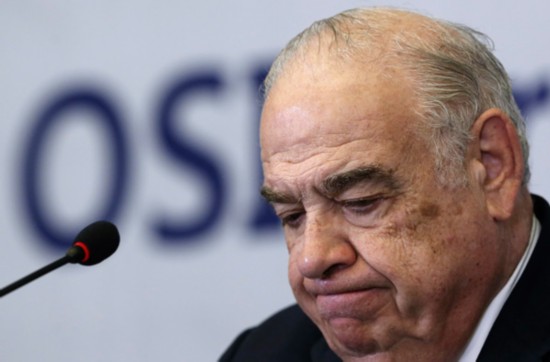 The 4th Chinese National Pole Dance Championship held in Tianjin
The 4th Chinese National Pole Dance Championship held in Tianjin
 Chinese navy commandos debut at 2014 RIMPAC
Chinese navy commandos debut at 2014 RIMPAC
 Guangxi impression: scenic countryside
Guangxi impression: scenic countryside
 World's largest aquatic insect found in Sichuan
World's largest aquatic insect found in Sichuan
 Ceremony volunteers for Youth Olympics make public appearance
Ceremony volunteers for Youth Olympics make public appearance
 A glimpse of female crew of Liaoning aircraft carrier
A glimpse of female crew of Liaoning aircraft carrier
 Stills from "Dad, where are we going?"
Stills from "Dad, where are we going?"
 Legless man's happy life
Legless man's happy life
 Top ten most beautiful islands in China
Top ten most beautiful islands in China
 Aerial view of Hong Kong
Aerial view of Hong Kong

OSI Group Chairman and CEO Sheldon Lavin attends a news conference in Shanghai, July 28, 2014. An on-going internal investigation conducted by OSI Group LLC into its unit, the scandal-hit Chinese food supplier Shanghai Husi Food Co Ltd, has revealed that standards were below par. [Photo/Agencies]
US-based OSI Group, owner of the Shanghai food company accused of selling expired meat, announced on Monday that it would invest 10 million yuan ($1.62 million) for a three-year food safety education campaign in China and establish an Asia Quality Control Center to regain market confidence.
Shanghai Husi Food, a food supplier for a number of global brands such as McDonald's, KFC, Pizza Hut and Starbucks, was accused by a television station last week of using expired meat as well as forging production dates to extend shelf time.
The case soon spread from the Chinese mainland to Hong Kong and Japan, and also provoked wide public anger.
David G. McDonald, president and chief operating officer of OSI Group, said the company is conducting an internal investigation, and that preliminary investigations have found issues that he said are absolutely inconsistent with internal product requirements and policies.
"We will fully cooperate with Shanghai FDA for the investigation," he said.
The group ceased operations of the Shanghai Husi plant for internal and external investigations, and extended their internal reviews to ensure that compliance met their global standards.
But the group didn't talk about compensation for consumers in China.
"We have put our focus on the investigation. We want to find out the reason behind the misconduct, and made by whom and for what motives," he said, adding that they will take swift and decisive action against those responsible.
The group also announced a number of changes in the organizational and management structure of OSI China. The operations in China will become a part of the OSI International umbrella, directly embedded into the corporate organization, rather than operating as a separate, decentralized entity. This new organization will be called OSI International China, according to David G. McDonald.
OSI International China will be managed by global management in accordance with global standards of quality management, which includes experienced individuals from around the world, he said.
"We know that we have let down our customers, the government, and the public of China," said Sheldon Lavin, chairman and chief executive officer of OSI Group, as he apologized at a news conference held in Shanghai on Monday.
"We understand that we need to rebuild and again earn respect, trust, reputation and forgiveness," he said.
The company reiterated its commitment in China and said it will set up an Asia Quality Control Center in Shanghai. The center will be staffed by a team of international and local teams, providing quality assurance for all OSI sites across the country and support for other Chinese food companies.
Meanwhile, it will launch a three-year food safety campaign in China with a 10 million yuan investment to boost staff training and promote awareness of food safety issues among the Chinese public.
"It is the cornerstone of our business and for our customers. We understand that we still have a lot of work to do to reclaim the respect and trust of our customers, the government and consumers," McDonald said.
The Shanghai food safety watchdog is still investigating the case, and it said on Monday that it will increase supervision of food safety and also encourage food company employees to report any misconduct.
 Zhujiang ambassadors attend lotus lanterns activity
Zhujiang ambassadors attend lotus lanterns activity
 From girly girl to tough special police officer
From girly girl to tough special police officer
 Children attend gymnastics training in summer
Children attend gymnastics training in summer
 Beautiful sceneries along the special travel route in Xinjiang
Beautiful sceneries along the special travel route in Xinjiang
 Focus on 1st female patrol team in Turpan
Focus on 1st female patrol team in Turpan
 Collection of 'China Dream' public-spirited ads
Collection of 'China Dream' public-spirited ads  National fitness team members integrate traditional and modern beauty
National fitness team members integrate traditional and modern beauty Moms on their kid’s coming out
Moms on their kid’s coming out Chinese fighters through lens
Chinese fighters through lens
 48 hours after super Typhoon Rammasun
48 hours after super Typhoon Rammasun Bikini show held at water park in Xi'an
Bikini show held at water park in Xi'an
 Lobster vs cat: catch me if you can
Lobster vs cat: catch me if you can  Heat waves sweep China
Heat waves sweep China  Top 10 most beautiful islands in China
Top 10 most beautiful islands in China
 Zhou Xun announces engagement to Archie Gao
Zhou Xun announces engagement to Archie Gao
Day|Week|Month